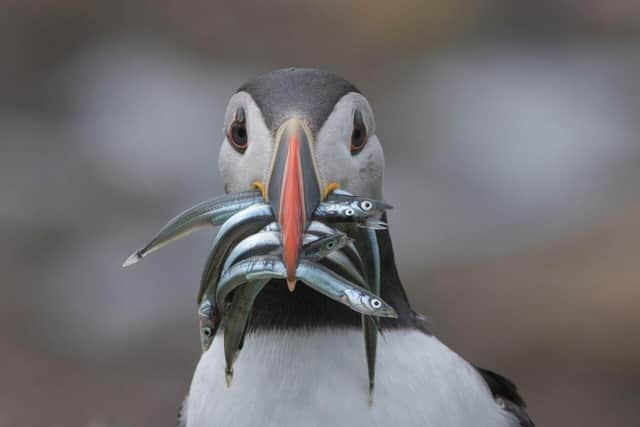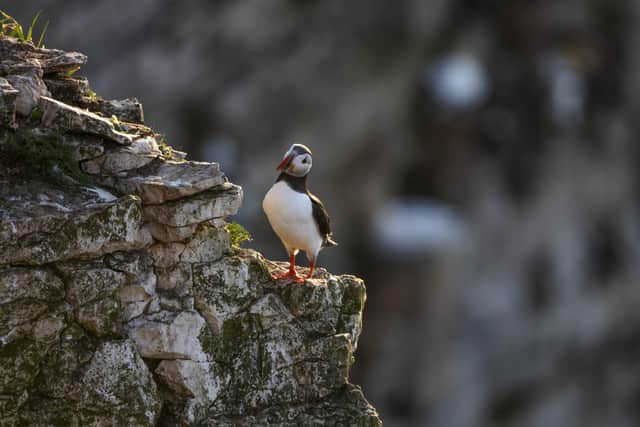New hope for Puffins returning to UK shores following Sandeel fishing closure
and live on Freeview channel 276
Following the much-celebrated announcement by the UK government to stop industrial Sandeel fishing in the English North Sea and all Scottish waters from 26 March 2024, the arrival of iconic Puffins back to our shores has been much anticipated.
As one of our rarest and most threatened seabirds, the sight of these remarkable creatures – with their distinctively bright orange feet and rainbow-coloured bills – is a wonderful occasion for all, signalling the start of a new nesting season.
Advertisement
Advertisement
Sandeels, a main source of food for Puffins and their chicks, are a vital link in the food chain for seabirds, as well as some fish species and sea mammals, yet their numbers have been rapidly declining due to climate change and overfishing.


Now, thanks to the permanent closure of Sandeel fishing coming into place in time for the breeding season, it is hoped that Puffins will be seen carrying many more fish, packed into their brightly coloured beaks, to their nests over coming summers.
The charismatic birds have already been delighting visitors in recent weeks as they arrive back at Rathlin Island, Northern Ireland, RSPB South Stack, North Wales, RSPB Sumburgh Head in Shetland, and at RSPB Bempton Cliffs, the UK’s largest mainland seabird colony.
Situated on the dramatic Yorkshire East coast, the seabird colony at RSPB Bempton Cliffs is of national and international importance. Around half a million seabirds, including Gannets, Kittiwakes, Guillemots and Razorbills as well as around 3,000 Puffins breed here each year, on the dramatic 400 feet high chalk cliffs.
Advertisement
Advertisement
Seen touching down on cliff faces across the UK, the return of Puffins this year will be a welcome sight, not least to those who have tirelessly campaigned to protect their main food source.


Tens of thousands of people, including RSPB supporters, called for an end to the fishing of Sandeels in UK waters last year. Now, with the permanent closure in place, seabirds, including Puffins, have been thrown a lifeline.
As Dave O’Hara, senior site manager at RSPB Bempton Cliffs, said: “RSPB Bempton Cliffs is home to one of the UK's top wildlife spectacles. But these populations of seabirds are at the forefront of the climate emergency, and they are in significant decline. Puffins’ resilience is being pushed to the limit, which is why we can breathe a sigh of relief that industrial Sandeel fishing in UK waters has now been ended.
“This lifeline will help to secure vital food sources for these amazing birds. Whilst many other factors continue to affect our seabird populations, including the impacts of climate change, and bycatch from fishing, we have renewed hope that Sandeels will increase in numbers, and help to save our beloved Puffins.”
Advertisement
Advertisement
The most recent seabird census, Seabirds Count, published in November 2023, suggests that over the last 20 years, shockingly, around one in four Puffins have been lost from across the UK since 2000.
It’s predicted that the UK’s Puffin population could plunge 90% by 2050 if global warming is unchecked. Facing threats to both their nesting sites and their food supply, the climate crisis is sadly only making things worse for these clowns of the sea.
As the RSPB’s director for conservation, Katie-Jo Luxton, describes: “Ending the industrial fishing of Sandeels – while a huge win for threatened birds such as Puffins and Kittiwakes – is just the first step in the efforts needed to safeguard seabirds.
“We are in a nature and climate emergency, and our seabirds face a barrage of pressures; overfishing and climate change affecting food availability, poorly planned offshore marine development excluding them from key habitats, and, most recently, the devastating impacts of bird flu. We therefore cannot take the arrival of Puffins back to our shores for granted.”
Advertisement
Advertisement
Puffins will continue arriving throughout April, stay to raise their Pufflings (one egg is laid per Puffin) and then leave at the end of July.
They winter out at sea, and whilst it’s not known exactly where, it’s believed they are widely dispersed out in the North Sea and wider Atlantic Ocean.